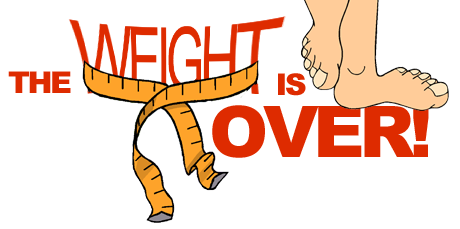Is fat is the new normal? It's time to say, "The weight is over!"

In one of my first columns here at ZDNet Health, I asked readers what kind of coverage you'd like to see. Reader Jerry1956, a personal trainer, said he wanted to see some articles about what he called the "fat epidemic," citing his concerns about the toll it's taking on America, especially in light of the increasing costs of healthcare.
I've decided to start addressing this important issue in a new series in this blog, and to call the series "The Weight is Over." Lots of people have used this catch phrase, and I like it because overweight is something that's really bothering a lot of us. We are sooo over it. We desperately want to find ways to get over being overweight, and get over it for good.
Although Americans are often called out for being overweight, Europeans aren't far behind. The UK also has a really big problem with big people; fattism and bullying are matters of great national concern.
In terms of statistics, 2/3 of Americans are overweight or obese. According to my colleagues over at CBS News, 85% of Americans have admitted to not eating right.
See on CBS News: Americans Don't Eat Healthy
That means that roughly 18% of us either have great metabolisms or we simply aren't showing consequences of our dietary misadventures...yet. The other 15% of us are apparently the only ones in right relationship with food, which probably looks something like what Michael Pollan describes in his book Food Rules.
So here's my take on it. I mean, if only 15% of us are abnormally perfect (or virtuous, depending on how you look at it), and 18% of us are self-righteous while at the same time getting away with murder, and 67% of us are actually overweight or obese, don't we kind of have to admit that fat is the new normal? So how do we deal with it when aspiring to normal isn't desirable?
Maybe we need to stop pretending and get honest. At some point, if the statistics are really true, and overweight is the new normal, all the anti-fat hatred really amounts to just so much self-hatred, no?
If we admit that we don't like the status quo, and we want to change for the healthier, coming from a place of self-hatred isn't the most empowered spiritual stance from which to battle the bulge.
Next: Exclusivity, class rage, politics, capitalism, and moral virtue »
« Previous: Is fat the new normal?
Exclusivity, class rage, politics, capitalism, and moral virtue
It doesn't help that to a lot of people, the lean ideal amounts to wanting to belong to an exclusive club that it's getting harder and harder to get into -- or to stay in if you actually make it there.
In terms of classism, for a large part of history, fat was considered a status symbol. It still is in some poorer countries. After all, if you could afford the finer things in life, you could afford to have a little extra meat on your bones. Now, it's considered classier to be leaner.
This is how it becomes a political issue.
People love to look down on the fat guy or gal gobbling down a bag of dollar-menu fast food, in the car, on the way to a second job. But it's probable that a lot of the "fat cat" banker types who destroyed our economy are actually having no problem eating right in nice restaurants, filling their refrigerators with healthy foods (a diet comprised of fresh foods, including lots of fruits and vegetables is quite costly), employing good cooks to prepare them, and attending sessions with personal trainers.
Skyrocketing costs of healthcare in our society is often cited as a justification for hating fatty, but how much did the fat cats cost us all?
Fat is a serious problem when it comes to women's issues, too. I found it mind-boggling when I read in The Beauty Myth by Naomi Wolf that most women would rather lose five to ten pounds than meet any other goal. ANY other goal. That's amazing to me. How much big world-changing energy is tied up in our desire to get smaller?
Women, who already earn less money than men, spend a lot of time, money, and energy on the pursuit of beauty because we've really bought into the messages that how easy we are on the eyes is the most important thing about us.
And who can blame us? We want to be good. We want to be liked, and even loved. We also want to make a decent living. Weight discrimination loses us even more money than it does our male counterparts.
Because of a desire to be thin and in control, eating disorders are destroying a lot of lives, even killing some sufferers -- not only women now, but also men in increasing numbers.
Plus, of course, there's the fact that in our economically competitive society, there are a lot of corporations vying for our food buck. They've employed the most talented scientists to come up with the most hyper-salient (tastiest) foods that'll keep us coming back for more, and the best marketers to introduce us to, help us fall in lust with, and constantly remind us of those foods.
This means we've gotten into an addictive cycle with food-like substances that are packed full of an unnatural amount of fat, sugar, and salt. I read a great book on my Kindle about this practice, and what can be done about breaking the food abuse cycle that ensues, entitled The End of Overeating: Taking Control of the Insatiable American Appetite by David A. Kessler, M.D.
Finally, we've come to equate fat with moral deficiency, and being thin with moral virtue. This isn't a new idea. After all, gluttony is listed as one of the seven deadly sins. It's probably one reason we'll accept cruelty and hatred toward fat people that we wouldn't accept toward any other group. Being thin is the 21st century way to be a good person. Eve Ensler explores this concept really well in her book The Good Body, which I enjoyed listening to on my iPod while trying to get in some cardio on my treadmill.
What makes me angry as a nurse is seeing the effect of the myths of weak-will and worthlessness take root as self-hatred in my patients. I am angry about the oppression they are experiencing from their obesity itself, and from other people in the form of abuse, ostracism, and economic punishment. To read another RN's perspective, check out Barbara M. Maxwell's Medscape article Obesity: Pain and Prejudice.
Next: What you can do about it »
« Previous: Exclusivity, class rage, politics, capitalism, and moral virtue
Nevertheless, what can we do about it?
If you, like me, are currently overweight, and you're sooo over it, what are you going to do about it?
Obviously there are a lot of factors conspiring to make this a difficult challenge. It's easy to point fingers of blame, it's easy to feel stuck or doomed, and its easy to fall back on emotional eating and simply give up. But in the long run, that "easy" way is the hard way, too, because of the many health problems (including adverse effects on cholesterol, blood pressure, insulin resistance, depression, and more) associated with being heavy.
See also: Another reason to eat those leafy greens
See also: If cholesterol had a love child with DNA, it’d look like this
So what can we do to be the change we want to see in the world? What can we do, even in these challenging circumstances to create ourselves as human beings who are leaner, fitter, more active, more comfortable socially, and most importantly, healthier?
Are you going to make a commitment to lose weight and do your best to keep it off? Are you going to become more active? Are you going to become more activistic on the issue in some way? How can we use tech to enhance our journey?
See also: Can iPhone Meal Snap photo app magically tell what’s in your meal? We put it to the test.
Weight, I am putting you on notice. You are so over.
Stay tuned for future articles in "The Weight is Over" series here on ZDNet Health, where I'll share relevant tips, techniques, stories, and tech. I'll also reveal what I've personally decided to do about it in my own life.
What are you going to do about it? Tell us in the TalkBacks below. Please try to be constructive. I don't want to see any "hate fatty" type stuff, whether that's in the form of self-hatred or hating others. Let's be loving and supportive here.
